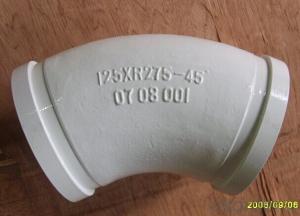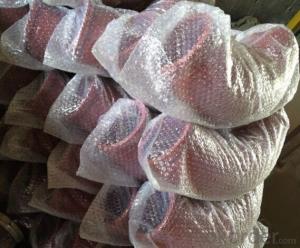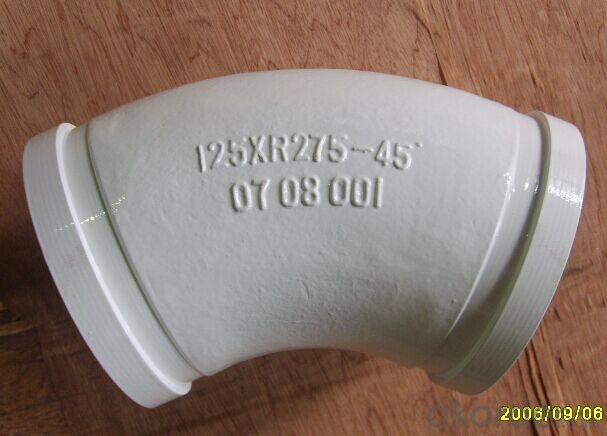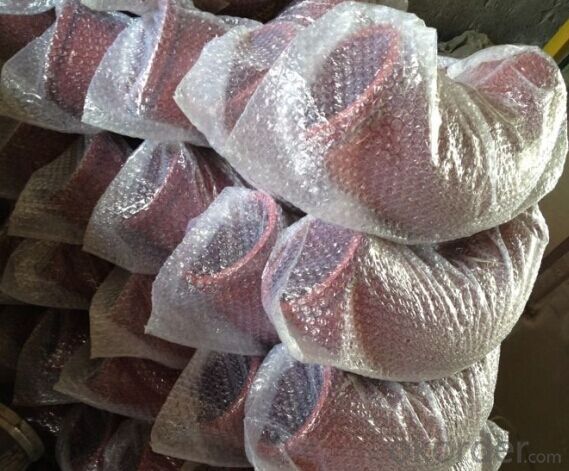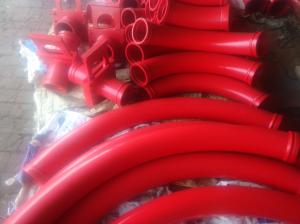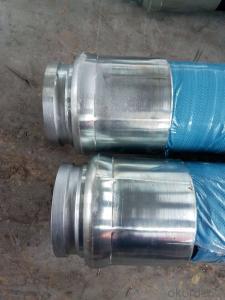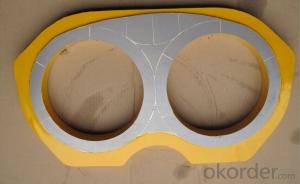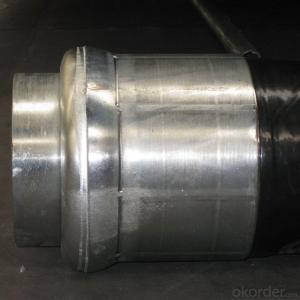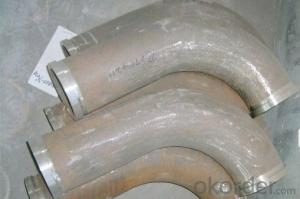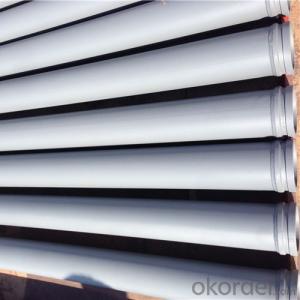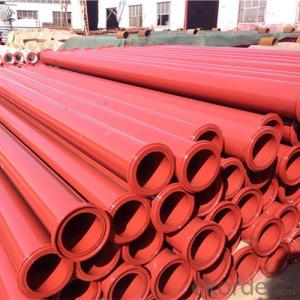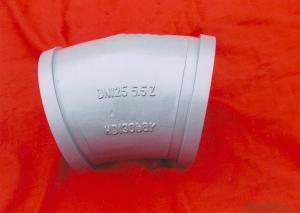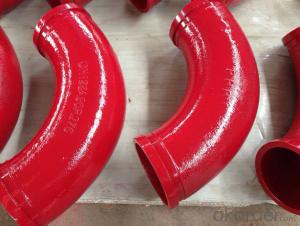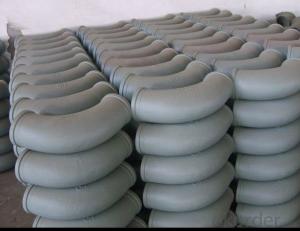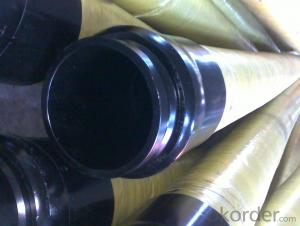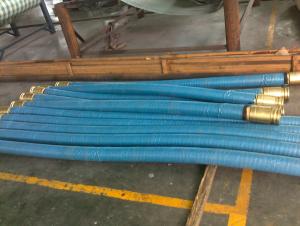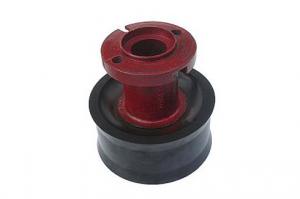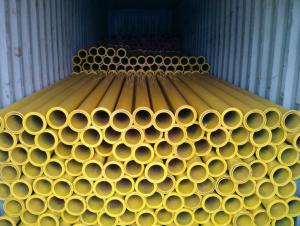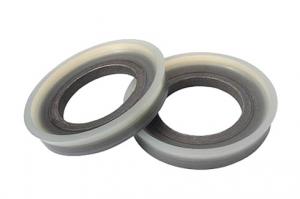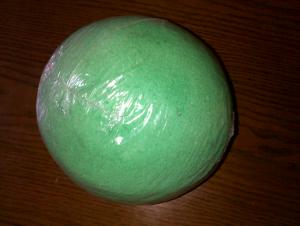CONCRETE DELIVERY ELBOW PM TYPE 15DEG R275 DN100
- Loading Port:
- Tianjin
- Payment Terms:
- TT OR LC
- Min Order Qty:
- 100 pc
- Supply Capability:
- 10000 pc/month
OKorder Service Pledge
OKorder Financial Service
You Might Also Like
concrete pump elbow table
Wear-resistant Single or Double Concrete Pump Elbow | |||||||
Type | Singe Elbow | Double Elbow | |||||
Model | DN125 | DN150 | DN175 | DN125 | |||
Material | Casting Steel ,ST52 | Inside | 40Cr | Outside | |||
Size | R275*90° | R275*90°+110 | 36° | F2000 | R275*90° | R275*90°+110 | |
R275*45° | R275*90°+211 | R400*30° | A3000 | R275*45° | R275*90°+211 | ||
R275*25° | R275*90°+411 | R400*45° | 471B | R275*25° | R275*90°+411 | ||
R275*20° | R275*90°+424 | R400*30° | 571B | R275*20° | R275*90°+424 | ||
R275*15° | R275*45°+170 | R488*90° | A1000 | R275*15° | R275*45°+170 | ||
R180*90° | R275*45°+310 | R500*90 | C1000 | R180*90° | R275*45°+310 | ||
R232*60° | R275*45°+310 | R280*90° | B2000 | R232*60° | R275*45°+310 | ||
R240*36° | 20°Lengthen | R240*36° | 20°Lengthen | ||||
R240*30° | 25°+740 | R240*30° | 25°+740 | ||||
R240*15° | 40°Zoomlion | R240*15° | 40°Zoomlion | ||||
R385*29° | R385*29° | ||||||
R315*33° | R315*33° | ||||||
Technic | Forged | ||||||
Average life | 25,000cubic | 50,000cubic | |||||
Appliciation | Used in concrete transport in construction work | ||||||
1.product profile:The double layer concrete pump elbow is developed by ourselves through new
technology and process.
2.characteristic:the inner layer of this concrete pump elbow undergoes heat treatment,and then the rigitiry can reach 62-65HRC.
3.characteristic:the outer layer of the concrete pump elbow possess good toughness properties
to protect the inner layer,so the security of the elbow is improved.
4.life:the experiment done abroad shows that the life of our concrete pump elbow can reach 35000-50000cbm,got the customers' praise
5.Beside the double layer concrete pump elbow,we produce all kinds of concrete pump parts,
straight pipe hose flange coupling and so on.
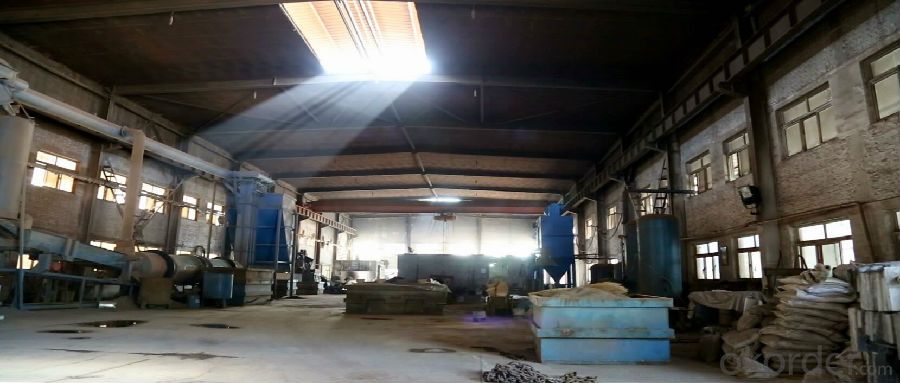
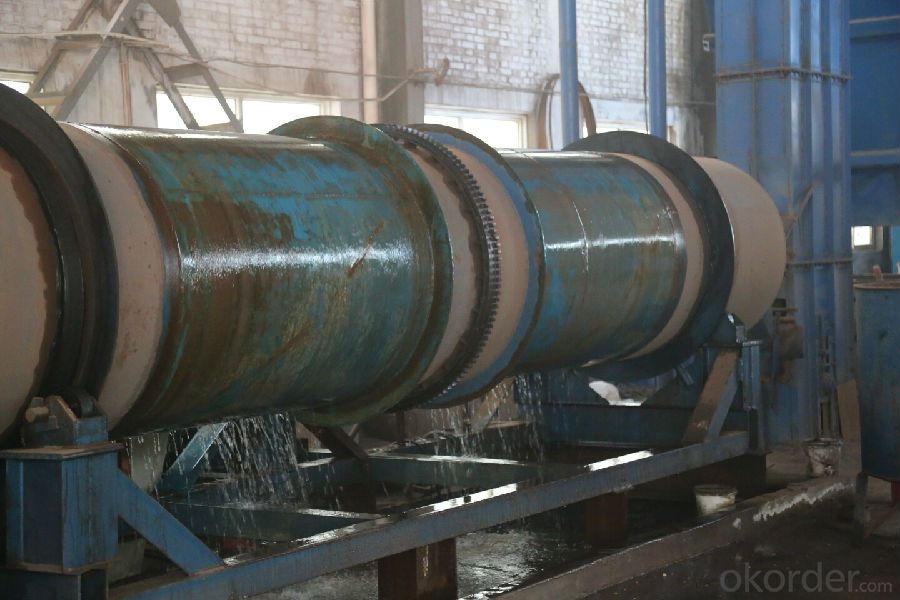
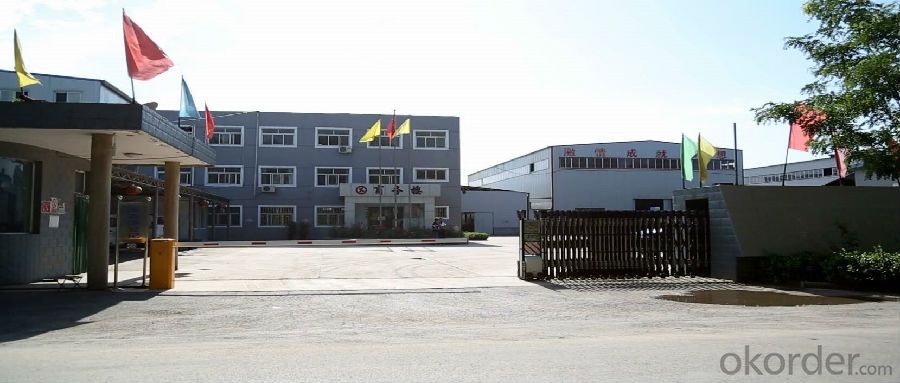
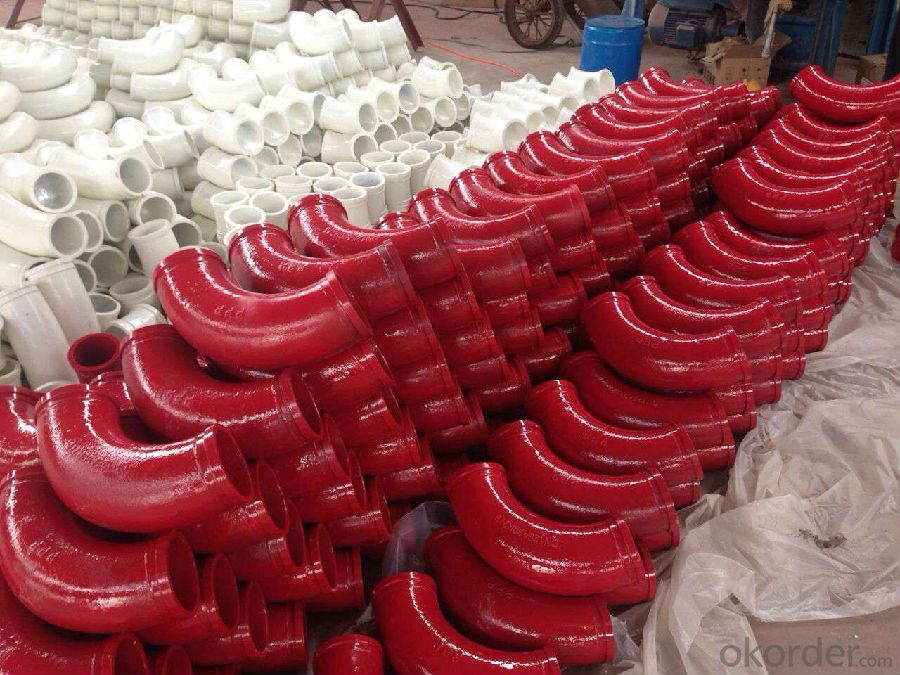
- Q: Can a concrete pump wear plate be repaired or does it need to be replaced entirely?
- In certain situations, a concrete pump wear plate may require repair or complete replacement. The determination of whether to repair or replace the wear plate depends on the extent of the damage and the overall condition of the plate. In the case of minor damages such as small cracks, dents, or worn out areas, suitable techniques can often be employed for repair. For instance, small cracks can be welded or filled with an appropriate epoxy or filler material. Similarly, dents or worn out areas can be filled and smoothed to restore the plate's functionality. However, if the wear plate has sustained significant damage, such as extensive cracks, severe corrosion, or large holes, it may be more advisable to replace the plate entirely. This is due to the potential compromise in the structural integrity and effectiveness of the wear plate if extensive damage is repaired. Optimal performance and safety of the concrete pump can be ensured by replacing the wear plate in these cases. Careful assessment of the wear plate's condition is crucial before deciding to repair or replace it. Seeking guidance from experts or professionals knowledgeable in concrete pump maintenance can provide valuable insights in making the appropriate decision. Additionally, regular maintenance and inspection of the wear plate can help detect potential issues early on, enabling timely repairs or replacements to prevent further damage and ensure the efficient operation of the concrete pump.
- Q: Can concrete pump spare parts be repaired or refurbished?
- Yes, concrete pump spare parts can be repaired or refurbished. Many common spare parts such as seals, bearings, valves, and hydraulic components can be repaired or refurbished to extend their lifespan and save costs. Repairing or refurbishing these parts can involve replacing worn-out or damaged components, reconditioning or re-machining certain parts, and performing necessary maintenance and testing to ensure their proper functionality. Additionally, some manufacturers or specialized companies may offer services for repairing or refurbishing specific concrete pump spare parts, allowing for a more cost-effective solution compared to purchasing brand new parts. However, it is important to note that not all spare parts can be repaired or refurbished, especially if they are severely damaged or have exceeded their recommended service life. In such cases, it may be more practical and safer to replace the parts with new ones.
- Q: How often should the concrete pump wear plate be replaced?
- The frequency of replacing the concrete pump wear plate depends on several factors such as the type of concrete being pumped, the volume of concrete being pumped, and the operating conditions of the pump. Generally, wear plates are designed to withstand a certain amount of wear and tear before requiring replacement. In most cases, it is recommended to inspect the wear plate regularly to check for signs of excessive wear. This can include visible cracks, erosion, or a significant decrease in thickness. Regular visual inspections can help determine when it is time to replace the wear plate. Additionally, monitoring the pump's performance and efficiency can also provide insights into the wear and tear on the wear plate. If there is noticeable decrease in the pump's output or an increase in the required pumping pressure, it may indicate that the wear plate needs to be replaced. However, it is important to consult the manufacturer's guidelines and recommendations for your specific concrete pump model. They often provide recommendations on the expected lifespan of the wear plate and the intervals at which it should be replaced. Following these guidelines can help ensure optimal performance and longevity of your concrete pump.
- Q: How does a hopper vibrator prevent concrete blockages?
- A hopper vibrator prevents concrete blockages by vibrating the hopper, which helps to dislodge any stuck or compacted material, allowing it to flow freely through the hopper and preventing blockages.
- Q: What is the function of a concrete pump control lever?
- The concrete pump control lever serves the purpose of managing the concrete flow and direction during pumping. It grants the operator the ability to initiate or halt pumping, regulate the pump's speed, and govern the concrete's placement and speed of placement. Additionally, the control lever empowers the operator to transition between various pumping modes, such as vertical or horizontal pumping, and fine-tune the pressure of the pumped concrete. As a whole, the control lever plays a vital role in guaranteeing precise and efficient concrete pumping procedures.
- Q: What are the different types of concrete pump hydraulic filters?
- There are three main types of concrete pump hydraulic filters: suction filters, return line filters, and pressure line filters. Suction filters are located at the inlet of the pump and prevent debris from entering the system. Return line filters clean the hydraulic oil as it returns from the system back to the reservoir. Pressure line filters are installed in the discharge line and remove contaminants before the oil reaches the hydraulic components.
- Q: What are the advantages of using stainless steel components in concrete pump spare parts?
- Concrete pump spare parts can benefit greatly from the use of stainless steel components. Firstly, stainless steel is highly resistant to corrosion and rust, which is essential in the concrete pumping industry where the equipment is constantly exposed to water, chemicals, and abrasive materials. By incorporating stainless steel components, the spare parts are able to endure these harsh conditions and have a longer lifespan compared to alternative materials. Secondly, stainless steel boasts exceptional strength and durability, enabling it to withstand high pressure and heavy loads. This makes it an ideal choice for concrete pump spare parts, ensuring the equipment operates efficiently and effectively without the risk of failure or breakdown. Moreover, stainless steel is known for its hygienic properties and ease of cleaning. In the concrete pumping industry, maintaining cleanliness is of utmost importance to prevent contamination and preserve the quality of transported concrete. Stainless steel components can be effortlessly cleaned and sanitized, guaranteeing that the spare parts meet the highest hygiene standards. Additionally, stainless steel offers an aesthetic appeal with its sleek and modern appearance. This can enhance the overall look of the concrete pump, which is particularly significant for businesses prioritizing their brand image and aiming to project a professional and high-quality impression to their clients. Lastly, stainless steel is an environmentally friendly option. It is completely recyclable, allowing for reuse and repurposing, thereby reducing the need for new materials and minimizing waste. This makes stainless steel components a sustainable choice for concrete pump spare parts. In conclusion, the use of stainless steel components in concrete pump spare parts provides numerous advantages such as corrosion resistance, strength, cleanliness, aesthetic appeal, and environmental sustainability. These benefits make stainless steel an excellent choice for the construction industry, ensuring reliable and efficient operation of concrete pumps.
- Q: Can a concrete pump pipe be repaired or should it be replaced?
- A concrete pump pipe can typically be repaired rather than replaced, depending on the extent of the damage.
- Q: How often should hopper vibrators be inspected or replaced in a concrete pump?
- Hopper vibrators in a concrete pump should be inspected regularly, ideally on a monthly basis, to ensure they are functioning properly. If any signs of wear, damage, or decreased performance are observed, it is recommended to replace them promptly to avoid any disruptions or issues during concrete pumping operations.
- Q: Can concrete pump spare parts be coated with corrosion inhibitors for long-term storage?
- Concrete pump spare parts have the capability to be coated with corrosion inhibitors in order to ensure long-term storage. Corrosion inhibitors, which are chemicals, can be applied onto metal surfaces to either prevent or minimize the corrosion process. By administering a coating of corrosion inhibitor onto concrete pump spare parts, a protective layer can be formed, preventing any contact between moisture, oxygen, and the metal. Consequently, the chances of corrosion are significantly reduced. This becomes particularly crucial when considering long-term storage, as the spare parts might encounter harsh environmental conditions or be stored in damp areas. Ultimately, the corrosion inhibitor coating serves to extend the lifespan of the spare parts and guarantee their preservation until they are required for use.
Send your message to us
CONCRETE DELIVERY ELBOW PM TYPE 15DEG R275 DN100
- Loading Port:
- Tianjin
- Payment Terms:
- TT OR LC
- Min Order Qty:
- 100 pc
- Supply Capability:
- 10000 pc/month
OKorder Service Pledge
OKorder Financial Service
Similar products
Hot products
Hot Searches
Related keywords
